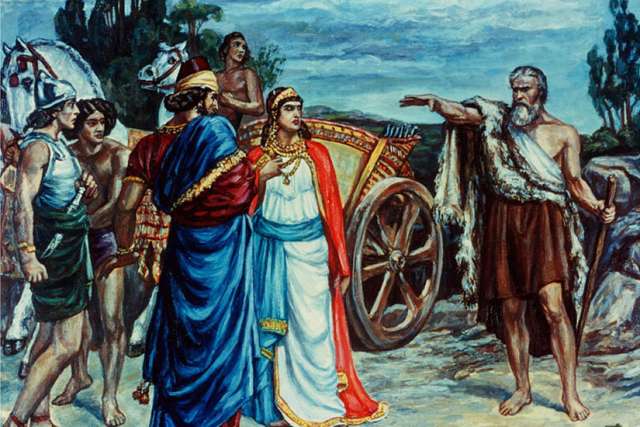19th Sunday in Ordinary Time (Year B) Aug. 9 (1 Kings 19:4-8; Psalm 34; Ephesians 4:30-5:2; John 6:41-51)
Elijah couldn’t take another step. He had been running for his life from the wicked queen Jezebel and her henchmen. He was so exhausted that he even prayed that God would take his life. Who has not felt like that at one time or another in their life?
Jesus is the humblest of foot soldiers
By Fr. Ron RolheiserSeveral years ago, the movie Argo won the Academy Award as best movie of the year. I enjoyed the movie in that it was a good drama, one that held its audience in proper suspense even as it provided some good humour and banter on the side. But I struggled with several aspects of the film.
God’s generosity is what we celebrate
By Fr. Scott Lewis, S.J17th Sunday in Ordinary Time (Year B) July 26 (2 Kings 4:42-44; Psalm 145; Ephesians 4:1-6; John 6:1-15)
There is not enough for everyone, so some will have to go without. This “me first” attitude took concrete form years ago in something called “lifeboat ethics.” The image of the lifeboat says it all: resources are limited, so they must be distributed only among the select few. The weak and marginalized, and anyone deemed burdensome, are to be left to themselves.
Perfect hands of the Good Shepherd
By Fr. Scott Lewis, S.J16th Sunday in Ordinary Time (Year B) July 19 (Jeremiah 23:1-6; Psalm 23; Ephesians 2:13-18; Mark 6:30-34)
Shepherds do not fare well in the Old Testament. Although the shepherd was supposed to be the one who protected and cared for the flock, it seldom worked out that way.
Without gratitude, we lose everything
By Mary MarroccoAt a conference I attended in Belgium, people around the dinner table got talking about the different countries they were from, and the characteristic spirit of each nation.
A primal understanding of the Eucharist
By Fr. Ron RolheiserChristian de Cherge, the Trappist Abbott who was martyred in Algeria in 1996, tells this story of his first communion. He grew up in a Roman Catholic family in France and on the day of his first communion he said to his mother: “I don’t understand what I’m doing.” She answered simply: “It’s okay, you don’t have to understand it now, later you will understand.”
Often man refuses to hear the truth
By Fr. Scott Lewis, S.JFifteenth Sunday in Ordinary Time (Year B) July 12 (Amos 7:12-15; Psalm 85; Ephesians 1:3-14; Mark 6:7-13)
Hit the road, Amos, and don’t come back! That was the message that Amaziah delivered to Amos. Amaziah was a priest at the sanctuary of Bethel in the Northern Kingdom of Israel, but he was also the king’s man. He belittled Amos’ qualifications, calling him “seer” rather than prophet, and he forcefully invited him to preach in his own land. He didn’t belong to the right guild or have the proper credentials. But Amos insisted he was an ordinary dresser of sycamore trees rather than a professional prophet. His prophetic call was the result of a direct and personal call from God.
Best we can do in the circumstances
By Fr. Ron RolheiserRecently I led a week-long retreat for some 60 people at a renewal centre. Overall, it went very well, though ideally it could have gone better. It could have gone better if, previous to the retreat, I had more time to prepare and more time to rest so that I would have arrived at the retreat well rested, fully energetic and able to give this group my total undivided attention for seven days.
God’s power manifests when we surrender to Him
By Fr. Scott Lewis, S.JFourteenth Sunday in Ordinary Time (Year A) July 5 (Ezekiel 2:3-5; Psalm 123; 2 Corinthians 12:7-10; Mark 6:1-6)
Who could blame Ezekiel if he had refused the role of prophet? The job description did not sound promising or encouraging. He was being given a thankless task that was doomed to failure. His mission was to prophesy to Israel, which sounded harmless enough, but the divine voice painted a very unflattering portrait of the nation. Impudent, stubborn and rebellious are not words that would give one hope of success.
God has greater plans for us beyond death
By Fr. Scott Lewis, S.JThirteenth Sunday in Ordinary Time (Year B) June 28 (Wisdom 1:13-15; 2:23-24; Psalm 30; 2 Corinthians 8:7, 9, 13-15; Mark 5:21-43)
Death is the enemy that humans fear most. People tend to blot it from their minds and often refuse to even talk about it. It is easy to bury it under a layer of euphemisms, even as aches, pains and illness become more frequent and unwelcome visitors. But in the end, death comes for us — all of us without exception.
The deepest secret inside wisdom
By Fr. Ron RolheiserEveryone longs to know something that’s secret, to know something that others don’t know, but that you know, and the knowledge of which gives you some insight and advantage over others who are outside the inner circle of that secret. It has always been so. Historically this is called “Gnosticism,” which forever makes an appearance in one form or another.












